- Home
- John le Carré
The Tailor of Panama Page 11
The Tailor of Panama Read online
Page 11
Pendel will give Benny whatever he asks, if only he will go on about the explosion.
“It was the smell of her, your father told me,” Benny resumes. “Pulling at his hair he was, with the remorse. Sitting before me as you’re sitting now, except for the uniform. ‘For the sake of her smell I brought down the temple on my head,’ he told me. Your father was a religious man, Harry. ‘She was kneeling at the grate and I smelt the sweet womanhood of her, not soap and scrubbing, Benny, but the natural woman. The smell of her womanhood overcame me.’ If Rachel hadn’t been having a knees-up with the Daughters of Jewish Purity on Southend Pier, your father would never have fallen.”
“But he did,” Pendel prompts him.
“Harry, amid the mingled tears of Catholic and Jewish guilt, amid Ave Marias and oi veys and what-will-become-of-me’s on both sides, your father plucked the cherry. See it as an act of God I can’t, but the Jewish chutzpah is yours and so is the Irish blarney, if you could only ditch the guilt.”
“How did you get me out of the orphanage?” Pendel demands, nearly shouting now, he cares so much.
Somewhere among his muddy memories of childhood before Benny rescued him there is a picture of a dark-haired woman like Louisa on her hands and knees while she scrubs a stone floor as big as a playground, watched by a statue of a blue-robed Good Shepherd and His Lamb.
Pendel driving the homeward stretch. Familiar houses long asleep. The stars washed clean by rain. A full moon outside his prison window. Bang me up again, he thinks. Prison’s where you go when you don’t want to make decisions.
“Harry, I was magnificent. Those nuns were French snobs and thought I was a gentleman. I wore the full Monty—a grey suit out of the window, a tie selected by your Auntie Ruth, socks to match, the shoes handmade by Lobb of St. James’s, which was always my indulgence. No swagger, hands to my sides, my socialism nowhere to be seen.” For Benny amid his myriad accomplishments is a passionate supporter of the Workers’ Cause and believer in the Rights of Man. “ ‘Mothers,’ I say to them, ‘I promise you this. Little Harry will have the good life if it kills me. Harry shall be our mitzvah. You tell me the wise men to take him to and he’ll be there on the dot with a white shirt for his instruction. A fee-paying education at the school of your choice I guarantee, the finest music on the gramophone and a home life any orphan child would give his eyes for. Salmon on the table, idealistic conversation, his own room to sleep in, a down mattress.’ I was on the way up in those days. No more shmatte for me; it was all golf clubs and footwear and the palace in Umbria just round the corner. We thought we’d be millionaires in a week.”
“Where was Cherry?”
“Gone, Harry boy, gone,” says Benny, dropping his voice for tragedy. “Your mother fled the coop, and who can blame her? One letter from an aunt in County Mayo, saying her poor sad Cherry was worn out from all the opportunities the Sisters gave her to wash away her sins.”
“And my father?”
Benny falls back into despair. “In the soil, son,” he says, wiping away fresh tears. “Your father, my brother. Where I should be for making you do what you did. Died of the shame, in my opinion, which is what I nearly do every time I look at you here. It was those summer frocks that did for me. There’s no more depressing sight on earth than five hundred unsold summer frocks in autumn, as every shlemiel knows. Each day that passed, the insurance policy became a temptation of the devil. I was a slave to convention is what I was, Harry, and what’s worse, I made you carry the torch for me.”
“I’m doing the course,” Pendel tells him, to cheer him up as the bell goes. “I’m going to be the best cutter in the world. Look at this, then.” And he shows him a panel of prison cloth that he cadged from stores and cut to measure.
It is on his next visit that Benny in his guilt presents Pendel with a tin-framed icon of the Virgin Mary that he says reminds him of his childhood in Lvov on the days he crept out of the ghetto to watch the goyim pray. And she is with him now, next to the wake-up clock on the rattan table at his bedside in Bethania, watching with her vanished Irish smile as he drags off his sweat-drenched prison uniform and creeps into bed for a share of Louisa’s blameless sleep.
Tomorrow, he thought. I’ll tell her tomorrow.
“Harry, that you?”
Mickie Abraxas, the great underground revolutionary and secret hero of the students, lucid drunk at two-fifty a.m., swearing to God that he would kill himself because his wife had thrown him out.
“Where are you?” Pendel said, smiling in the dark, because Mickie for all the trouble he caused was a cellmate for life.
“Nowhere. I’m a bum.”
“Mickie.”
“What?”
“Where’s Ana?”
Ana was Mickie’s reigning chiquilla, a sturdy, practical-minded childhood friend of Marta’s from La Cordillera who seemed to accept Mickie as found. Marta had introduced them.
“Hi, Harry,” said Ana cheerfully, so Pendel said “Hi” cheerfully too.
“How much has he had, Ana?”
“I don’t know. He says he went to a casino with Rafi Domingo. Did some vodka, lost some money. Maybe did a little coke, he forgets. He’s sweating all over. Do I call a doctor?”
Mickie was back on the line before Pendel could answer her.
“Harry, I love you.”
“I know that, Mickie, and I’m grateful, and I love you too.”
“Did you do that horse?”
“I did, Mickie, yes, I have to say I did that horse.”
“I’m sorry, Harry. Okay? I’m sorry.”
“No problem, Mickie. No bones broken. Not every good horse wins.”
“I love you, Harry. You’re my good friend, hear me?”
“Then you won’t need to kill yourself, will you, Mickie,” said Pendel kindly. “Not if you’ve got Ana and a good friend.”
“You know what we do, Harry? We make a weekend together. You, me, Ana, Marta. Go fishing. Fuck.”
“So you have yourself a good night’s sleep, Mickie,” said Pendel firmly, “and tomorrow in the morning you come round for your fitting and a sandwich and we’ll have a nice natter. Yes? Right, then.”
“Who was it?” Louisa said as he rang off.
“Mickie. His wife’s locked him out of the house again.”
“Why?”
“Because she’s having an affair with Rafi Domingo,” said Pendel, wrestling with life’s ineluctable logic.
“Why doesn’t he punch her in the mouth?”
“Who?” said Pendel stupidly.
“His wife, Harry. Who do you think?”
“He’s tired,” said Pendel. “Noriega beat the spirit out of him.”
Hannah climbed into their bed, to be followed by Mark and the giant teddy bear he had given up years ago.
It was tomorrow, so he told her.
I did it to be believed, he told her, when she was safely back to sleep.
To prop you up when you get wobbly.
To give you a real shoulder to lean on, instead of just me.
To make me someone better for a Zonian roughneck’s daughter who blurts a bit and goes ballistic when she’s threatened and forgets to take short steps after twenty years of being told by her mother that she’d never get married like Emily if she didn’t.
And thinks she’s too ugly and too tall while everyone around her is the right size and glamorous like Emily.
And who would never in a million years, not even in her most vulnerable and insecure moment, not even to spite Emily, set fire to Uncle Benny’s warehouse as a favour to him, starting with the summer frocks.
Pendel sits in the armchair, pulls a coverlet over himself, leaves his bed to the pure in heart.
“I’ll be out all day,” he tells Marta, arriving in the shop next morning. “You’ll have to do front of shop.”
“You’ve got the Bolivian ambassador at eleven.”
“Put him off. I need to see you.”
“When?”
; “Tonight.”
Until now they had gone as a family, picnicking in the shade of the mango trees, watching the hawks and ospreys and vultures lazing on the burning breeze and the riders on white horses looking like the last of Pancho Villa’s army. Or they’d haul the inflated rubber dinghy across the flooded paddies, with Louisa at her happiest as she waded through the water in her shorts, playing Katharine Hepburn in The African Queen to Pendel’s Bogart, and Mark pleading for caution and Hannah telling Mark not to be a drip.
Or they’d drive the four-track down cloudy yellow dust tracks that stopped dead when they reached the forest’s edge, at which point to the huge delight of the kids Pendel would let out one of Uncle Benny’s wonderful wails of despair, pretending they were lost. Which they were, until the silver towers of the mill rose out of the palm trees fifty yards ahead of them.
Or they’d go at reaping time, ride in pairs on huge tracked harvesters, the flails hanging out in front of them, beating the rice and raising clouds of bugs. Sticky hot air pressed under hard low sky. Table-flat fields fading into mangrove swamps. Mangrove swamps fading into sea.
But today as the Great Decider drove his solitary path everything he saw bothered him, everything was an omen: the I-hate-you razor wire of the American ammunition dumps, reminding him of Louisa’s father; the reproachful signs saying, “Jesus is the Lord”; the squatters’ cardboard villages on every hillside: any day now and I’ll be joining you.
And after the squalor, the lost paradise of Pendel’s ten-minute childhood. Rolling tracts of red Devon earth from holiday school at Okehampton. English cows that stared at him from banana groves. Not even Haydn on the cassette player could save him from their melancholy. Entering the farm’s drive he demanded only to know how long it was since he had told Angel to get these bloody potholes fixed. The sight of Angel himself, in boned riding boots, straw trilby and gold neck chains, only quickened his anger. They drove to the spot where the corporate neighbour from Miami had cut his trench into Pendel’s river.
“You know something, Harry, my friend?”
“What?”
“What that judge did is immoral. Here in Panama, when we bribe somebody we expect loyalty. You know what else we expect, my friend?”
“No.”
“We expect a deal to be a deal, Harry. No top-ups. No pressure.
No comebacks. I say the guy is antisocial.”
“So what do we do?” Pendel said.
Angel gave the contented shrug of a man whose favourite news is bad.
“You want my advice, Harry? Straight? As your friend?”
They had reached the river. On the opposite bank, the neighbour’s henchmen refused to notice Pendel’s presence. The trench had become a canal. Below it, the riverbed was dry.
“My advice, Harry, is negotiate. Cut your losses, do a deal. You want me to feel these guys out? Start a dialogue with them?”
“No.”
“So go to your banker. Ramón’s a tough guy. He’ll do the talking for you.”
“How come you know Ramón Rudd?”
“Everybody knows Ramón. Listen, I’m not just your manager, okay? I’m your friend.”
But Pendel has no friends, except for Marta and Mickie, and just possibly Mr. Charlie Blüthner, who lives ten miles up the coast and is expecting him for chess.
“Blüthner like piano?” Pendel asked the living Benny centuries ago as they stood on the rain-swept dockside at Tilbury, studying the rusted freighter that will convey the released convict on the next stage of his life’s toil.
“The same, Harry boy, and he owes me,” Benny replied, adding his tears to the rain. “Charlie Blüthner is the shmatte king of Panama, and he wouldn’t be where he is today if Benny hadn’t kept shtum for him just like you did for me.”
“Did you burn his summer frocks for him?”
“Worse, Harry boy. And he’s never forgotten.”
For the first and last time in their lives, they embraced. Pendel wept too but wasn’t sure why, because all he could think as he trotted up the gangway was: I’m out and I’ll never come back.
And Mr. Blüthner had been as good as Benny’s word. Pendel had scarcely set foot in Panama before the maroon chauffeur-driven Mercedes was whisking him from his pitiful lodgings in Calidonia to the stately Blüthner villa, set in its own manicured acres overlooking the Pacific, with its tiled floors and air-conditioned stables and paintings by Nolde and illuminated testimonials from impressive-sounding, nonexistent American universities appointing Mr. Blüthner their well-beloved Professor, Doctor, Regent, etc. And an upright piano from the ghetto.
Within weeks Pendel had become in his own eyes Mr. Blüthner’s cherished son, taking his natural place among the raucous, gingery children and grandchildren, the stately aunts and podgy uncles, and the servants in their pastel-green tunics. At family festivals and Kiddush, Pendel sang badly and nobody minded. He played lousy golf on their private golf course and didn’t bother to apologise. He splashed around on the beach with the children and rode the family buggies at breakneck speed over sand-black dunes. He fooled with the sloppy dogs and threw fallen mangoes for them, and watched the squadrons of pelicans crank themselves across the sea, and believed in all of it: their faith, the morality of their wealth, the bougainvillea, the thousand different greens, and their respectability, which far outglowed whatever little blazes Uncle Benny might have started in the days of Mr. Blüthner’s struggle.
And Mr. Blüthner’s kindness didn’t stop in the home, because when Pendel took his first steps into bespoke tailoring, it was Blüthner Compañia Limitada who gave him six months’ credit on their huge textile warehouse in Colón, and the Blüthner word that sent him his first customers and opened early doors for him. And when Pendel tried to thank Mr. Blüthner, who was small and wrinkled and shiny, he only shook his head and said, “Thank your Uncle Benny,” adding his habitual advice: “Find yourself a good Jewish girl, Harry. Don’t leave us.”
Even when Pendel married Louisa, his visits to Mr. Blüthner did not cease, but they acquired a necessary furtiveness. The Blüthner household became his secret paradise, a shrine that he could only ever visit alone and under a pretext. And Mr. Blüthner, by way of reciprocation, preferred to ignore Louisa’s existence.
“I’ve got a bit of a liquidity problem, Mr. Blüthner,” Pendel confessed, as they sat over chess on the north verandah. There was a verandah on each side of the headland, so that Mr. Blüthner could always be protected from the wind.
“Liquidity at the rice farm?” Mr. Blüthner asked.
His little jaw was made of rock until he smiled, and he wasn’t smiling. His old eyes spent a lot of time asleep. They were sleeping now.
“Plus the shop,” said Pendel, blushing.
“You have mortgaged the shop to finance the rice farm, Harry?”
“Only in a manner of speaking, Mr. Blüthner.” He tried humour. “So naturally I’m looking for a mad millionaire.”
Mr. Blüthner always spent a long time thinking, whether he was playing chess or being asked for money. He sat quite still while he thought, and seemed not to breathe. Pendel remembered old lags who were the same.
“Either a man is mad or he’s a millionaire,” Mr. Blüthner replied at last. “Harry boy, it’s a law. A man’s got to pay for his own dreams.”
He drove to her nervously, as he always did, by way of 4th July Avenue, which had once formed the boundary of the Canal Zone. Low to his left, the bay. High to his right, Ancón Hill. Between them lay the reconstructed El Chorrillo, with its patch of too green grassland marking the spot where the comandancia had stood. A cluster of gimcrack high-rises had been built by way of reparation and painted in pastel bars. Marta lived in the middle one. He climbed the filthy staircase cautiously, remembering how the last time he had come here he had been pissed on from the pitch darkness above him while the building convulsed itself with prison catcalls and wild laughter.
“You are welcome,” she said solemnly, having un
locked the door to him, four locks.
They lay on the bed where they always lay, dressed and separated from each other, Marta’s small dry fingers curled in Pendel’s palm. There were no chairs, there was very little floor. The flat consisted of one tiny room divided by brown curtains: a cubicle to wash in, another to cook in, and this one to lie in. At Pendel’s left ear stood a glass case crammed with china animals that had belonged to Marta’s mother, and at his stockinged feet a three-foot-high ceramic tiger that her father had given to her mother for their twenty-fifth wedding anniversary three days before they were blown to smithereens. And if Marta had gone with her parents to visit her married sister that night instead of lying in bed nursing her smashed face and beaten body, she would have been blown to smithereens as well, because her sister had lived in the first street to be hit, though today you wouldn’t find it: any more than you would find Marta’s parents, sister, brother-in-law or sixmonth-old baby niece, or their orange cat called Hemingway. Bodies, rubble, and the whole street had been swept into official oblivion.
“I just wish you’d move back to your old place,” he said to her as usual.
“I can’t.”
Can’t because her parents had lived where this building now stood.
Can’t because this was her Panama.
Can’t because her heart was with the dead.
They spoke little, preferring to contemplate the monstrous secret history that joined them:
A young, idealistic, beautiful female employee has been taking part in a public demonstration against the tyrant. She arrives at her place of work breathless and afraid. Come evening, her employer offers to drive her home, with the undoubted aim of becoming her lover, because in the tension of recent weeks they have become irresistible to each other. The dream of a better Panama is like the dream of a shared life together, and even Marta agrees that only the Yanquis can cure the mess the Yanquis have created, and that the Yanquis must act soon. On the way, they are stopped at a roadblock by Dingbats, who wish to know why Marta is wearing a white shirt, which is the symbol of resistance to Noriega. Receiving no satisfactory explanation, they obliterate her face. Pendel lays the freely bleeding Marta in the back of his car and drives in blind panic and at breakneck speed to the university—Mickie is a student too in those days—and by a miracle finds him in the library—and Mickie is the only person Pendel can think of who is safe. Mickie knows a doctor, calls him, threatens, bribes him. Mickie drives Pendel’s four-track, Pendel sits in the back with Marta’s head bleeding all over his lap, soaking his trousers and messing up the family upholstery forever. The doctor does his worst, Pendel informs Marta’s parents, gives money, showers and changes clothes at the shop, goes home by cab to Louisa, and for three days is prevented by guilt and fear from telling her what has happened, preferring to regale her instead with a cock-and-bull story about some idiot driving into the side of the four-track, total write-off, Lou, have to get a whole new one, I’ve spoken to the insurance boys, doesn’t seem to be a problem. Not till day five does he find the courage to explain deprecatingly that Marta got herself mixed up in a student riot, Lou, facial injuries, long recuperation necessary, I’ve promised to take her back when she’s recovered.

 The Honorable Schoolboy
The Honorable Schoolboy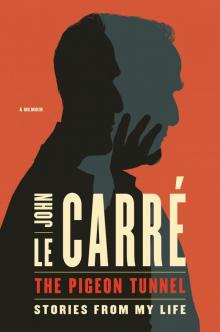 The Pigeon Tunnel: Stories From My Life
The Pigeon Tunnel: Stories From My Life Single & Single
Single & Single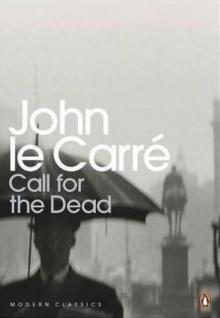 The Spy Who Came in From the Cold
The Spy Who Came in From the Cold The Looking Glass War
The Looking Glass War The Night Manager
The Night Manager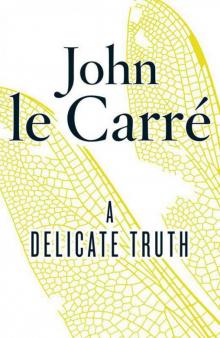 A Delicate Truth
A Delicate Truth A Perfect Spy
A Perfect Spy The Little Drummer Girl
The Little Drummer Girl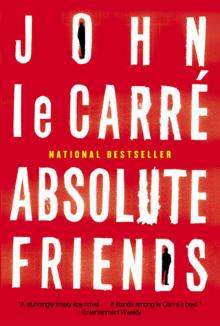 Absolute Friends
Absolute Friends A Murder of Quality AND Call for the Dead
A Murder of Quality AND Call for the Dead The Russia House
The Russia House The Tailor of Panama
The Tailor of Panama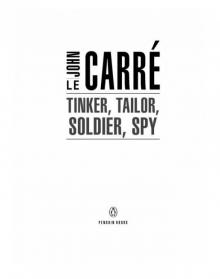 Tinker, Tailor, Soldier, Spy
Tinker, Tailor, Soldier, Spy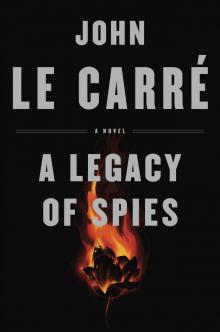 A Legacy of Spies
A Legacy of Spies The Mission Song
The Mission Song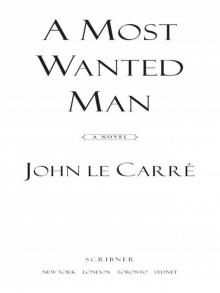 A Most Wanted Man
A Most Wanted Man John Le Carré: Three Complete Novels
John Le Carré: Three Complete Novels The Secret Pilgrim
The Secret Pilgrim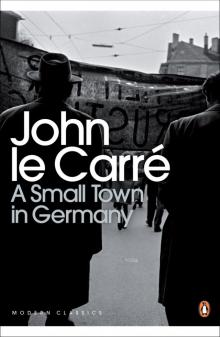 A Small Town in Germany
A Small Town in Germany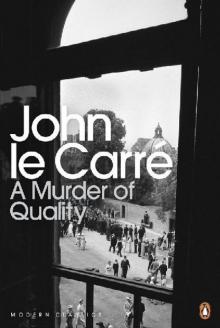 A Murder of Quality
A Murder of Quality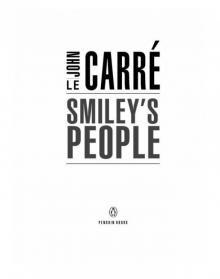 Smiley's People
Smiley's People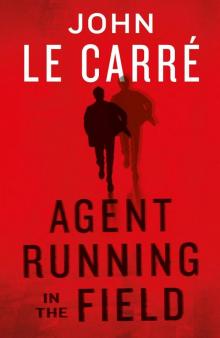 Agent Running in the Field
Agent Running in the Field The Spy Who Came in from the Cold s-3
The Spy Who Came in from the Cold s-3 The Pigeon Tunnel
The Pigeon Tunnel The Russia House - 13
The Russia House - 13 The Honourable Schoolboy
The Honourable Schoolboy Call For The Dead s-1
Call For The Dead s-1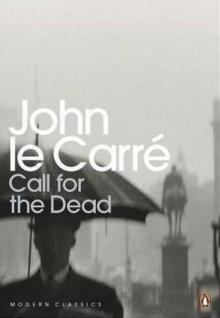 Call for the Dead
Call for the Dead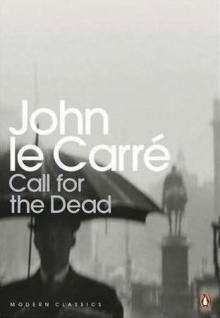 Call for the Dead - 1
Call for the Dead - 1